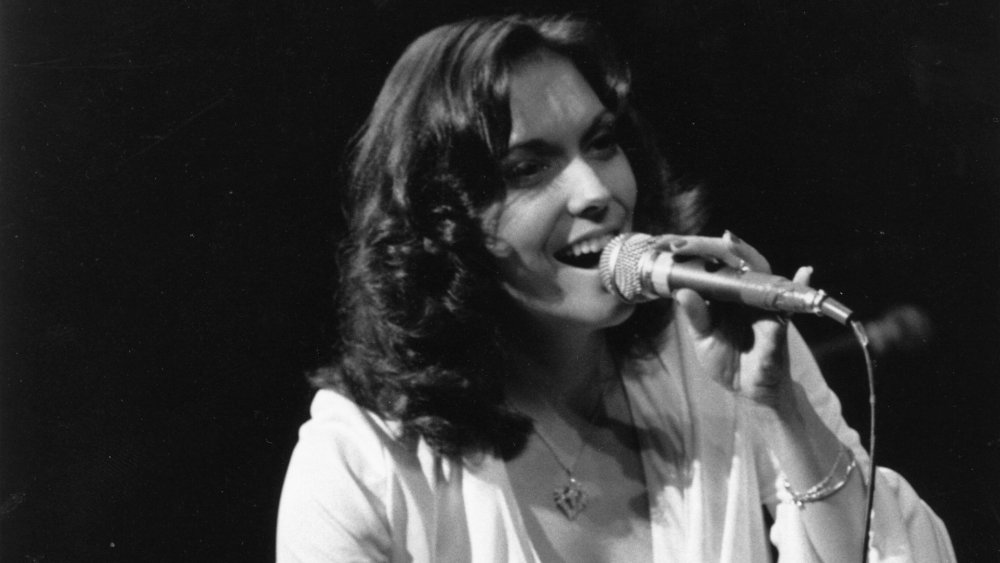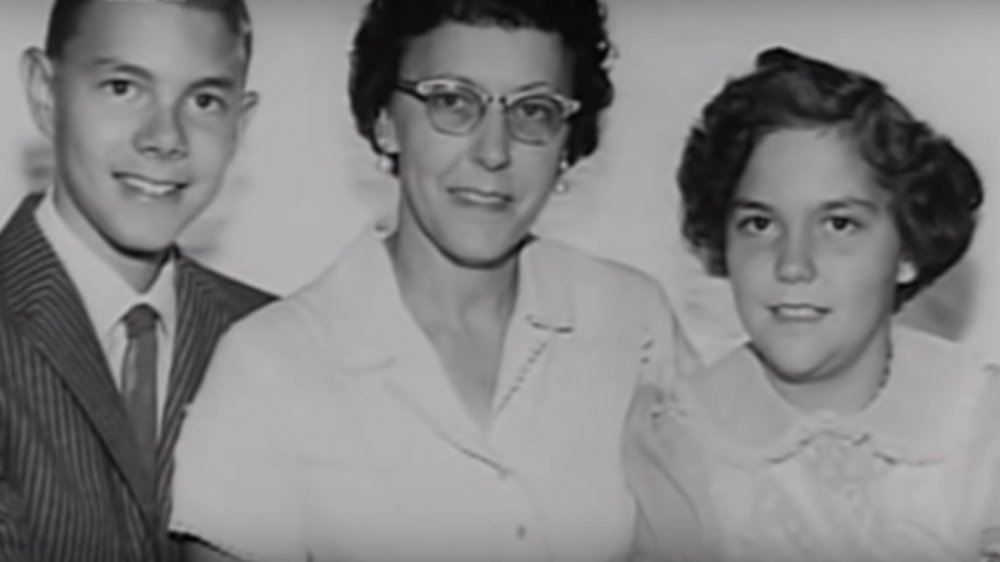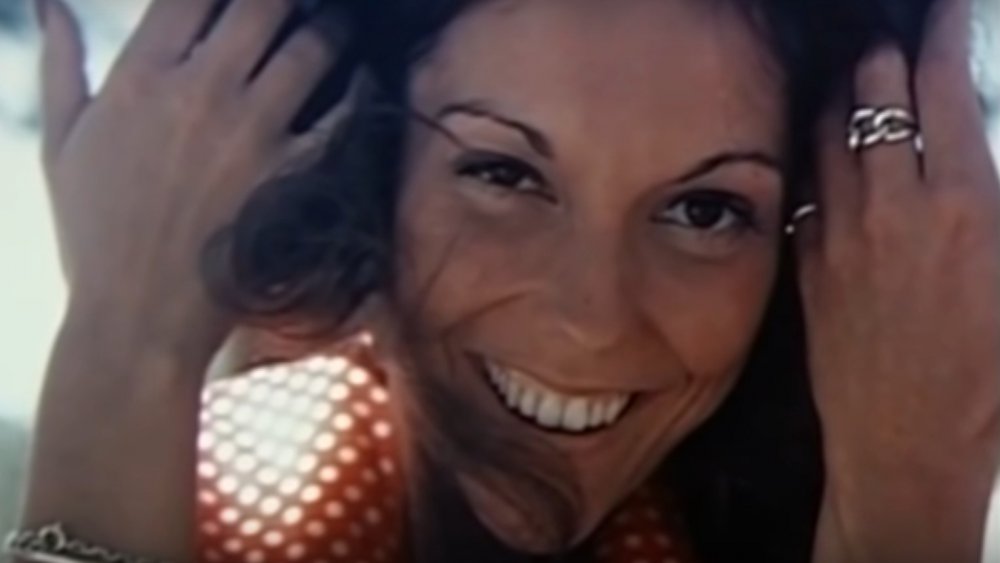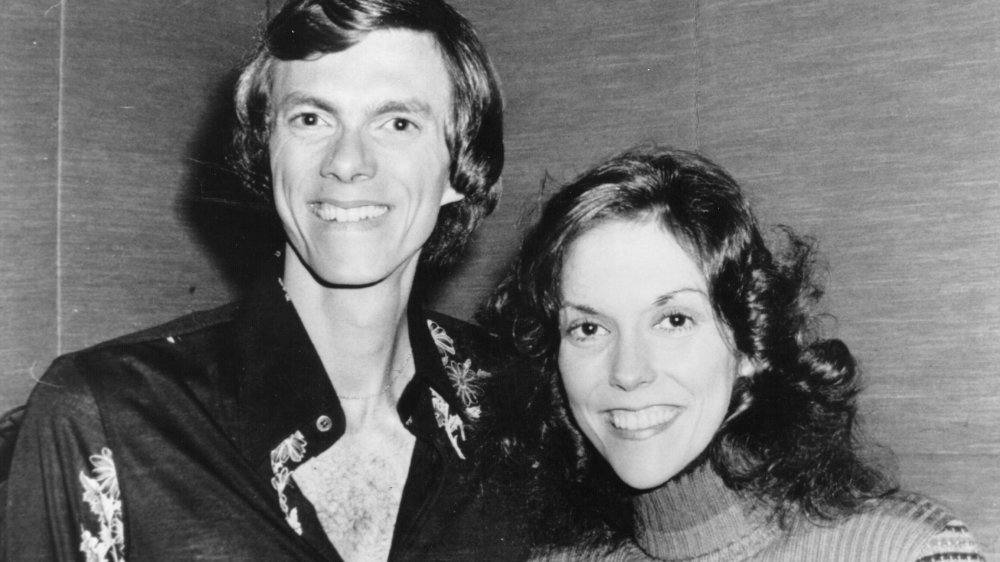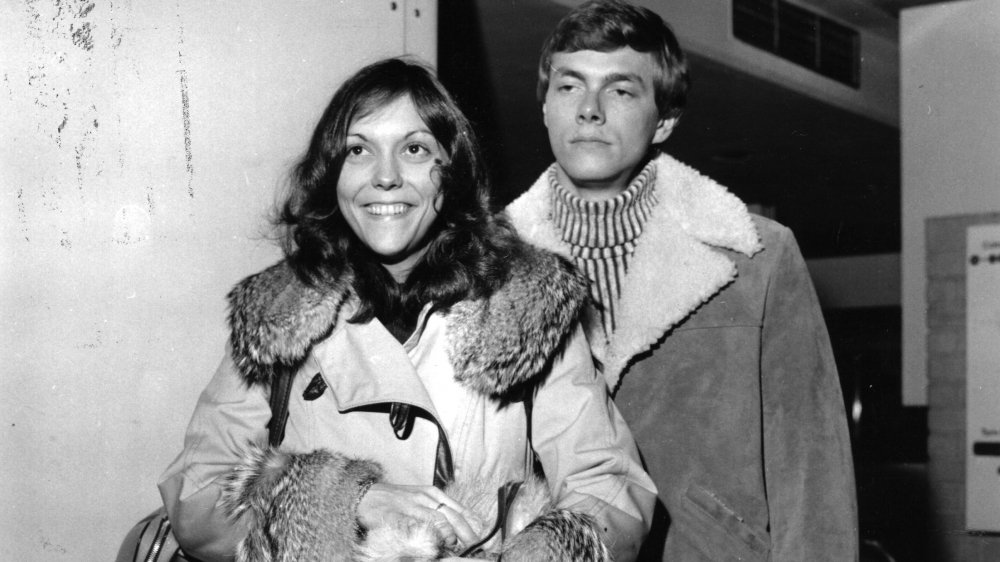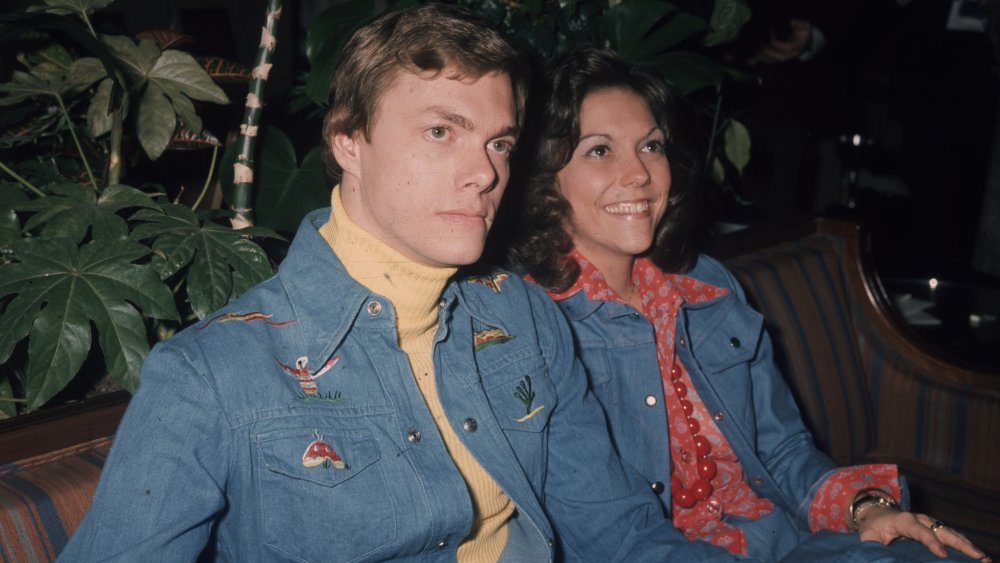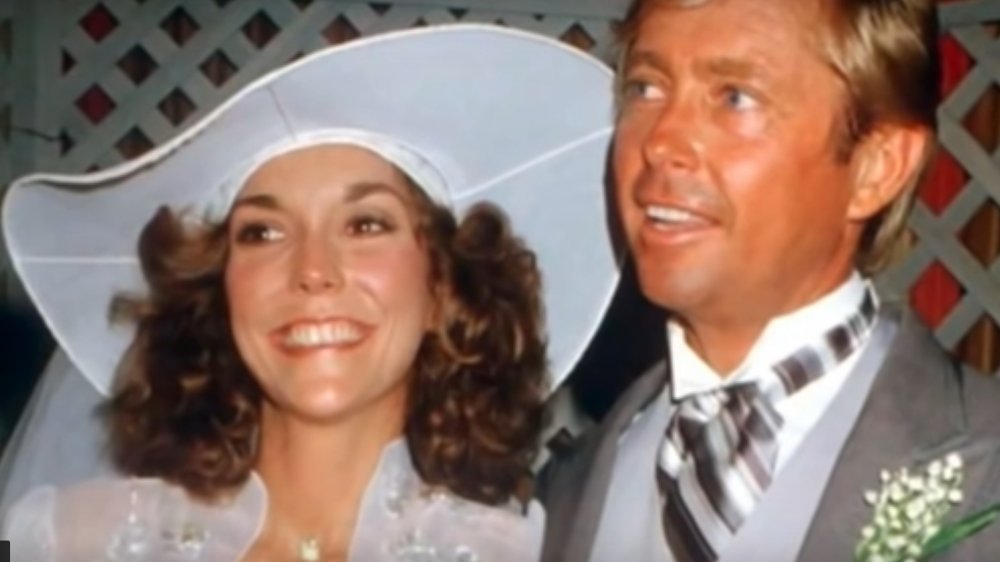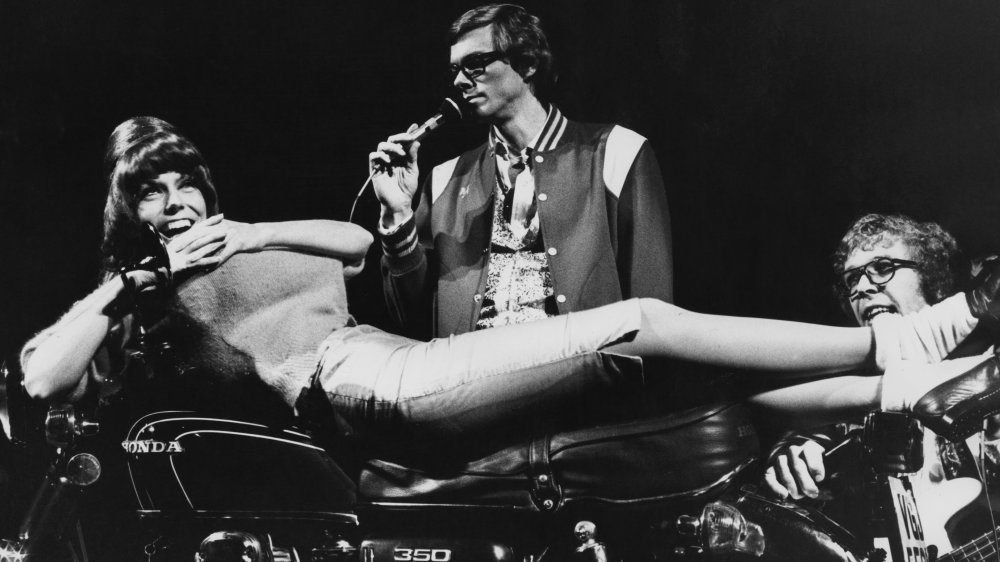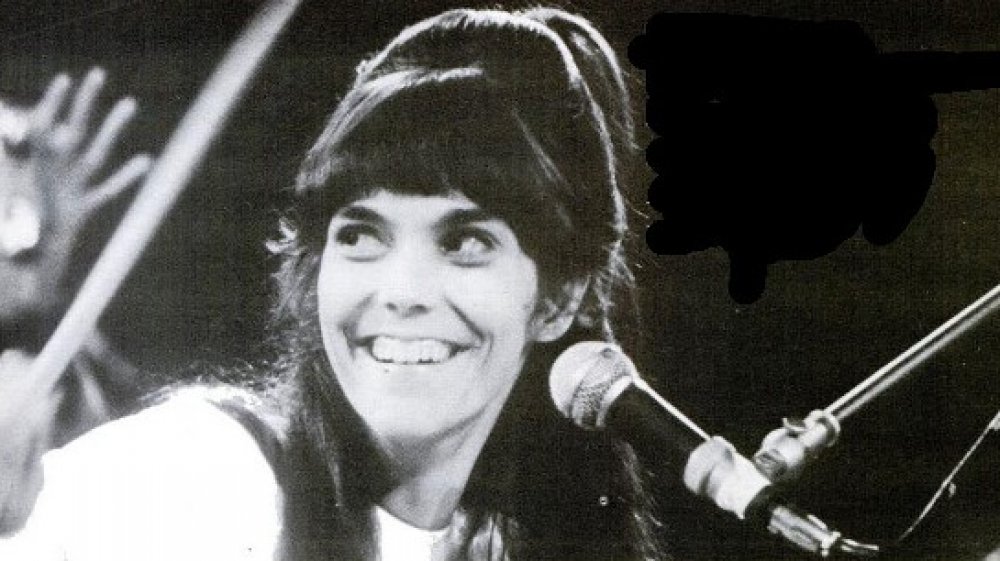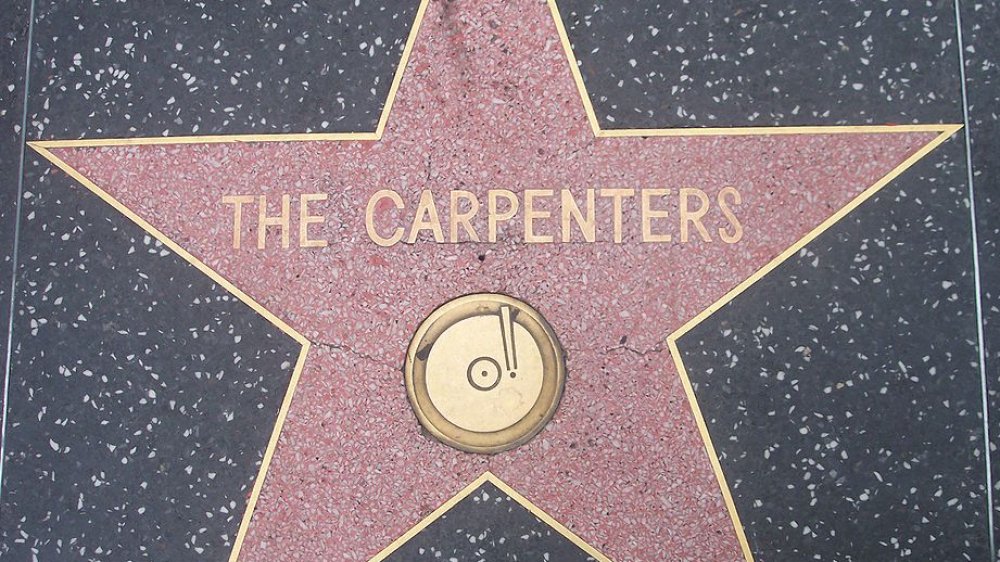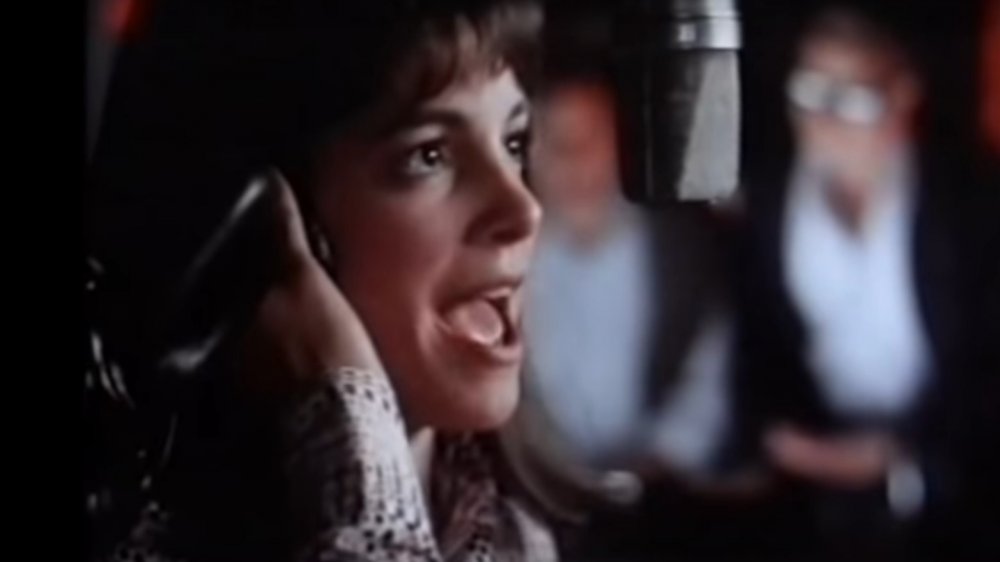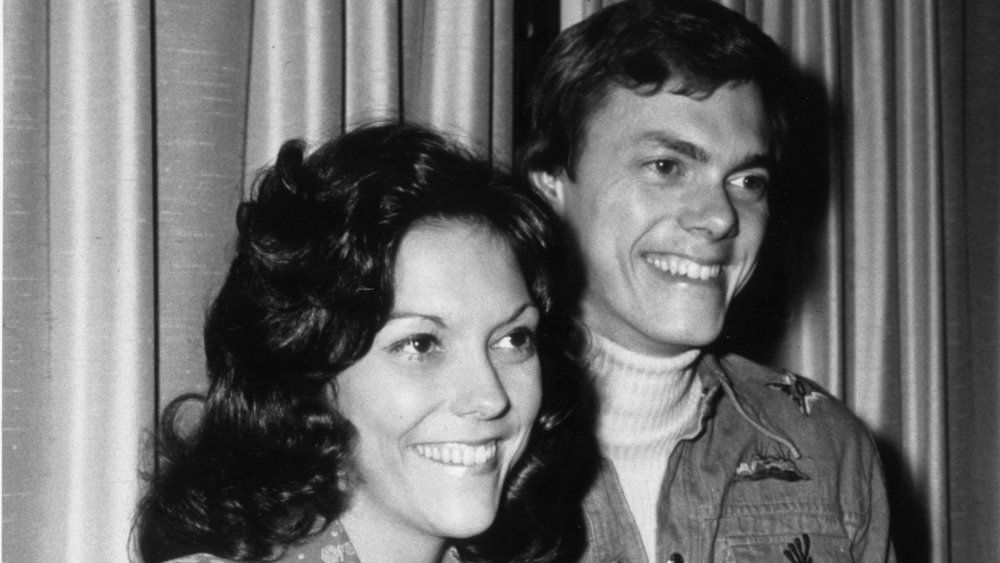The Tragic Real-Life Story Of Karen Carpenter
Karen Carpenter, one half of the brother-sister duo The Carpenters, and the velvet voice behind hits like "Close to You," "Rainy Days and Mondays," "We've Only Just Begun," and "Top of the World," enjoyed a meteoric rise to fame in the 1970s only to literally disappear before her fans' very eyes.
Carpenter was one of the first celebrities to fight a public battle with anorexia nervosa. When she lost that battle in 1983 at age 32, the medical establishment, not to mention Carpenter's family and friends, were for the most part in the dark about the disease. It's one of life's great ironies that it took Carpenter's death for people to take the condition seriously.
Also ironic is that fact that Carpenter, who made a name for herself crooning about love and relationships and romance, went to her grave convinced that she herself was unlovable. Read on for more about this beautiful song bird gone too soon.
Karen Carpenter was not her mother's favorite and she knew it
Karen Carpenter was born in 1950 in New Haven, Connecticut. Her family moved to Downey, California when she was 13-years-old. By then it was clear that her older brother, Richard, was a piano prodigy. It was also clear that he was their mother's favorite child. In this excerpt from Randy L. Schmidt's biography, Little Girl Blue: The Life of Karen Carpenter, Schmidt suggests that Carpenter's struggle with eating disorders — she was afflicted with bulimia as well as anorexia — was in part a direct response to knowing that her mother, Agnes, didn't really love her. Not like she loved Richard, anyway. Carpenter couldn't control her mother's affections, but she could control her food intake.
As this piece in The Irish Independent makes clear, Agnes was more concerned with outward appearances than she was with Karen's mental health. In a therapy session following Karen's first hospitalization for anorexia, the therapist asked Karen's family to tell her they loved her. Her father and brother did so readily. Agnes, on the other hand, dodged the request and chastised the therapist for referring to her by her first name, a habit she considered gauche.
In the CBS made-for-TV movie The Karen Carpenter Story, Agnes gets a redemptive moment. Karen is walking up the stairs, and, unbeknownst to everyone, is on the verge of death. Agnes finally tells her she loves her. Unfortunately, the line is pure fiction.
When Karen Carpenter developed anorexia, no one knew what it was
Karen Carpenter started dieting when she was a teenager. At 5'4" and 145 pounds, she was often told she looked chubby. She began her efforts to lose weight with the Stillman water diet, so-called because it was the brainchild of Dr. Irwin Maxwell Stillman, and because adherents were told to drink eight glasses of water a day. She soon lost twenty pounds. As she became more and more obsessed with her food intake, she dropped down to an alarming 90 pounds.
According to this article in Time, most of the people in Carpenter's support system thought she simply needed to consume more calories. No one understood that she was suffering from a very real disorder, anorexia nervosa — her bandmate, John Bettis, admitted that he didn't even know how to pronounce "anorexia" until Carpenter had been suffering from it for five years — and that her issues with food came down not to weight but to control.
Carpenter grew up desperate for the affections of an indifferent mother, and her career as a singer was steered by her domineering older brother. Anorexia was a way, as Yahoo News points out, for her to exercise control over her own affairs, but, because both medical and mental health professionals didn't know how eating disorders worked, it took longer than it should have for Carpenter to get the help she needed. By the time she did receive proper treatment, it was too late.
Karen Carpenter was under her brother's thumb
Karen Carpenter liked to sing and dance, but, as a young girl, she never got the kind of encouragement and praise her brother did. Richard, the apple of their mother's eye, was a Yale-trained piano prodigy. When Karen joined Richard's band just after high school, she wasn't even considered for the front woman role. Instead, she was thrown behind the drum kit, which, truth be told, was fine with her. She loved a good beat. Then, when that band broke up, Richard suggested to Karen they take on the world as a brother-sister duo.
Their big break came quickly. In 1969, they signed with A&M Records, and while their first album, Offering, was a relative flop, their second, Close to You, was a triumph. They found themselves feted all over the country. Radio listeners loved the pair's gentle-on-the-ears sound, and Karen's voice, much more than Richard's tinkling of the ivories, took center stage. Richard, used to the spotlight, wasn't always thrilled with his sister's notoriety. In fact, he was quite jealous. This became particularly clear when he became addicted to Quaaludes. Then Karen recorded a solo album in 1980. According to this look at The Carpenters' career in the AV Club, Richard ridiculed the record, and the album was shelved. It wasn't released until after Karen's death in 1983.
When it came to her weight, Karen Carpenter could not win
Karen Carpenter started watching her weight as a teenager. Convinced that she was too chubby, she went on diet after diet, shedding pounds, hiring a personal trainer, and eventually resorting to taking laxatives, thyroid medication, and expectorants to maintain a trim figure.
At first, friends were supportive of the weight loss. When she got down to 110 pounds — from a high of 165 — they told her she looked great. Carpenter didn't stop there, though, and as she continued to shrink, people around her grew alarmed. Fans worried she might have cancer. According to this piece in Time, audience members audibly gasped when she came out on stage, her hip bones jutting through the thin gowns she preferred at the time. A critic with Variety ignored her performance and focused instead on her looks and dress, whining that she was too thin and should be outfitted "more becomingly." Even her own husband, Thomas Burris, dismissed her as a "bag of bones."
The young woman who once saw herself as too fat was now being criticized for being too skinny. She simply could not win. Tragically, when, in the winter of 1983, she began to pursue a more healthy lifestyle, gradually regaining the weight she'd lost, her heart — damaged from years of near starvation and drug abuse — could not support her larger frame.
The Carpenters had to cancel a huge tour because of Karen's health
In 1975, Richard and Karen were poised to head out on their very first world tour, the 50 dates of which sold out in a matter of hours. It soon grew clear, however, that Karen was too ill to travel. Her weight had plummeted and she was spending 14 hours a day in bed. Karen's doctors at the time refused to let her take part in the tour and it was cancelled. According to the biography Little Girl Blue: The Life of Karen Carpenter, Richard and Karen probably lost roughly $250,000 as a result. Karen was racked with guilt over the inconvenience suffered by her record company and, of course, ticket holders, all of whom had their purchase refunded.
Had the tour taken place, it was almost certain to be a record-setter. Estimates suggested it would have grossed $1.2 million. In 1975.
On one hand, the anxiety over the cancellation was the last thing Karen Carpenter needed. On the other, it was clear that she was too exhausted to handle the grueling nature of overseas touring. Richard and A&M executive Terry Ellis traveled to London and Tokyo to publicly apologize for the cancellation. During a press conference, Ellis blamed Karen — and Karen's gender — for the fall-out. "Girls," he said, "just can't take that life without something going wrong." He later walked back the remark.
Not so true love
Having achieved incredible professional success by her early twenties, Karen Carpenter wanted only two things to make her life complete: true love and a family of her own. She thought she was getting exactly what she hoped for in Thomas Burris, a 39-year-old real estate developer she met in June of 1980. She and Burris had a whirlwind romance and, much to the shock and dismay of some of Carpenter's friends, they decided to marry that August. Burris was handsome and, judging by his lavish lifestyle, very successful. Carpenter was completely infatuated.
The infatuation didn't last long. According to this biographical excerpt, Burris confessed just days before the wedding to having had a vasectomy years earlier. Carpenter was distraught. She'd hoped Burris would make her a mother. She called her own mother, Agnes, to tell her the wedding was off. Agnes, however, thought a little thing like complete betrayal nothing in the face of the money she'd personally spent on the upcoming nuptials. She told Karen that she'd made her bed and would have to lie in it.
And lie in it Karen did. She submitted meekly to Burris's physical and mental abuse and watched helplessly as he drained her bank account. She ended the marriage after barely a year, brokenhearted, childless, and robbed not only of her fortune but her belief in love.
Karen Carpenter was hounded by stalkers and needy fans
As if Karen Carpenter's story weren't sad enough, she also had to contend with obsessed fans honing into her private life and pestering her with letters detailing their problems with drugs and mental illness and parents who didn't love them. In this profile in Rolling Stone, Carpenter referred to the more difficult cases as "the strangies," saying, "They ask for advice that I'm not capable of giving. Because I'm not a doctor. It's hard to tell someone how to live their life even if you know 'em, let alone if you've never seen them."
At one performance in Dallas, while an opening comedy act warmed up the audience, a man rushed the stage and sat down at Carpenter's drum kit. Everyone just assumed he was part of the fun, but then, when it was clear he was a crasher, police escorted him from the stage. He fought them the whole way, insisting he was Carpenter's fiance. He was was the tip of the iceberg. At the height of The Carpenters' popularity, an endless line of men randomly showed up at Karen's parents' home in Downey, California, asking for her. One ended his vigil by screaming her name over and over again.
But what seemed to weigh most heavily on Carpenter's thin shoulders was serving as a role model for young people: "I mean ... we only wanted to ... make a little music ..."
Karen Carpenter died just when it seemed she was getting better
One of the saddest facts of Karen Carpenter's melancholy life is that, when she died in 1983 of heart failure, she seemed to be on the mend. According to this article in BuzzFeed, the day before she died could not have been more typically boring and suburban. She spent the day shopping for a washer-dryer and the evening with her parents. The three of them had dinner at Big Boy — she had a shrimp salad — and then settled in to watch bad TV together.
Conspicuously absent from her final hours was the drama surrounding what her family referred to as her "over-dieting." She even ate a few tacos while she watched TV. At the time she was a healthy 110 pounds, up from the 80 she weighed during her last hospital stay. Her brother and musical partner, Richard, had every reason to believe she was on her way to recovery after an eight-year battle with anorexia. He and Karen were, as People magazine points out, in the midst of recording their 12th album, Voice of the Heart.
Karen died on the floor of her room in her parent's California home. Her heart, weakened from years of starvation dieting and abuse of the expectorant, Ipecac, finally gave out. She was found nude. She'd been reaching for a fuzzy bathrobe.
Karen Carpenter died knowing her star was falling
In the seventies, the Carpenters were, to borrow the title of one of their most popular tunes, on top of the world. They'd taken over the radio waves with a squeaky clean slate of hits like "Close to You," "Superstar," and "We've Only Just Begun," and they'd scored a couple of Grammy awards. The brother-sister duo were steadily gaining a loyal fanbase, thanks to their easy listening style and Karen's smooth-as-molasses contralto.
Then, the eighties hit and their popularity began to wane, partially because both Richard and Karen were fighting private demons — in his case an addiction to Quaaludes and in hers, anorexia nervosa — but also because they were facing a very real shift in the public's musical taste. Hair bands and heavy metal were in, sweet tunes about birds magically appearing and newfound love were out. Some critics, like this one at Consequences of Sound, suggest that me-decade proto-hipsters destroyed The Carpenters' reputation.
Regardless of who was to blame for The Carpenters' star falling, music fans continue to disagree about their legacy, with many weighing on the side that they were too cheesy to be taken seriously, and the other side — which includes Paul McCartney and Rolling Stone — swearing that they were the real deal. It's hard to argue with this statistic: the official YouTube video of Karen Carpenter singing "Rainy Days and Mondays" had almost 30 million views in 2019. Too bad she didn't live to see it.
The movies they made about Karen Carpenter's life were unworthy (or just weird)
In 1989, six years after Karen Carpenter's death, CBS released the made-for-TV movie The Karen Carpenter Story. As this review in Time makes clear, the docudrama, while largely enjoyable, refuses to dig very deeply into the nuances of Carpenter's too-short life, opting instead for easy, obvious moments like the one where young Richard taunts Karen with a pizza and the shot in which, on the very day of her death, her cold-hearted mother, Agnes, finally tells Karen she loves her. The movie ends with Karen smiling into the camera. So, even though she's about to die on the floor of her room, naked, her heart having given out, all is right with the world?
Some critics think she got better treatment in Todd Haynes' pulls-no-punches, Barbie-helmed short Superstar: The Karen Carpenter Story. You read that right. Barbie. Karen is Barbie, Richard is Ken. The other characters are, likewise, portrayed by dolls. Superstar begins on the day Karen died with a title card warning viewers that they are about to watch "an extremely graphic picture of the internal experience of contemporary femininity." The film takes aim at Richard Nixon (whom the Carpenters performed for while the Vietnam War raged), Agnes, and the "fascism" that lies at the heart of American capitalism. Richard Carpenter sued Haynes in 1990 for using several Carpenters' songs without permission and for suggesting Richard might be a closeted homosexual. It's now banned.
Cheated in death
In January 2017, Richard Carpenter sued his and Karen's former record company, A&M, and Universal Music Group for cheating them — well, him — out of the royalties associated with digital downloads. According to Variety, Carpenter took the companies to task for breach of contract, arguing that he'd only received a "minuscule fraction" of the digital royalties owed him. Chocking up the issue to multiple accounting errors on the part of A&M and Universal, Richard asked the court to reward him and Karen Carpenters' estate $2 million in compensatory damages.
Richard Carpenter based part of his argument on the success he and Karen shared with their record companies: "The Carpenters recordings are among the best sellers in the history of popular music and after 48 years continue to contribute a substantial amount to UMG/A&M's annual bottom line. It seems only fair that these companies account fairly to my sister's estate and to me."
The case was settled out of court. No terms were divulged.
